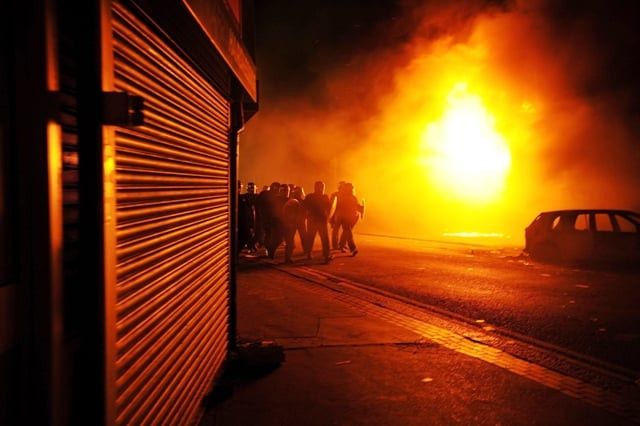Flames, rioting engulf London for third day
Prime Minister David Cameron heads back to Britain to face the crisis.

(Read: Protests in London)
In unprecedented scenes of rioting in the capital, buildings were in flames in Croydon, Peckham and Lewisham in the city's south, while gangs of looters roamed the streets of Hackney in the east, Clapham in the south, Camden in the north and Ealing in the west.
Scotland Yard said it had deployed an extra 1,700 officers to deal with the London unrest, the worst in years. Armoured cars were used to quell the rioters.
Hundreds of riot police poured into Hackney to try to contain the violence in a district just a few kilometres from where the 2012 Olympics will take place in a year's time.
As darkness fell, police wielding batons pushed the youths back, while local residents hoping to return to their homes were kept behind police cordons.
In Croydon, an entire block of buildings, including a 100-year-old family furniture business, was ablaze, sending flames leaping into the night sky.
Local residents were evacuated due to the spreading fire, while the Guardian newspaper quoted a nearby officer as admitting: "We can't cope. We have passed breaking point."
A 26-year-old man was found injured in a car with gunshot wounds in Croydon, police said. He was taken to hospital and was in a serious condition.
Just outside Croydon town centre, hordes of looters roamed the streets unchallenged while the smell of burning cars and buildings hung in the air, an AFP correspondent said.
Firefighters also battled a severe blaze in Clapham after looters rifled their way through the renowned Debenhams department store.
Wealthy neighbourhoods were not spared with rampagers forcing their way into Michelin-starred restaurant The Ledbury in Notting Hill before stealing diners' phones, plates off the tables and attempting to take the till.
The violence first erupted on Saturday in the multi-ethnic neighbourhood of Tottenham in north London after a man was shot dead by police two days earlier.
Copycat violence then spread to other areas of the British capital on Sunday before reaching to new districts on Monday.
Rioting also broke out in the English cities of Liverpool, Birmingham and Bristol.
West Midlands Police confirmed they had made 87 arrests as youths ran rampage in Birmingham centre overnight, smashing shop windows and looting merchandise.
Meanwhile, Merseyside Police confirmed Tuesday they were dealing with disorder in the north west city of Liverpool with several cars set alight while Bristol officers battled to contain a mob of around 150 youths.
Prime Minister Cameron, who had resisted calls to cut short his family holiday in Italy amid last week's turmoil on the financial markets, was due to return to Britain Tuesday, his Downing Street office said.
He will chair a meeting of Britain's emergency response committee and hold separate talks with the Home Secretary Theresa May and the acting London police chief.
Police said Tuesday they had made 334 arrests over the three days, including an 11-year-old boy. At least 35 police officers were injured in the unrest at the weekend. Sixty-nine people were charged.
Acting Metropolitan Police Commissioner Tim Godwin earlier urged parents to "start contacting their children" to find out where they were before slamming "spectators getting in the way of the police operations."
Tensions remained high in Tottenham following the shooting on Thursday of 29-year-old Mark Duggan, which sparked the first riots in London.
There were fresh doubts about the original account of his death during a police operation against gun crime within the black community.
The father-of-four was shot in a taxi in what was initially said to have been an exchange of gunfire. But reports said it was possible that police officers were not under attack when they opened fire.
Tottenham was the scene of severe rioting on the Broadwater Farm housing estate in 1985 when police constable Keith Blakelock was hacked to death.
After Duggan's death, rumours spread online that he had been killed in an assassination-style execution with shots to the head, something the Independent Police Complaints Commission was forced to deny in a statement.



















COMMENTS
Comments are moderated and generally will be posted if they are on-topic and not abusive.
For more information, please see our Comments FAQ